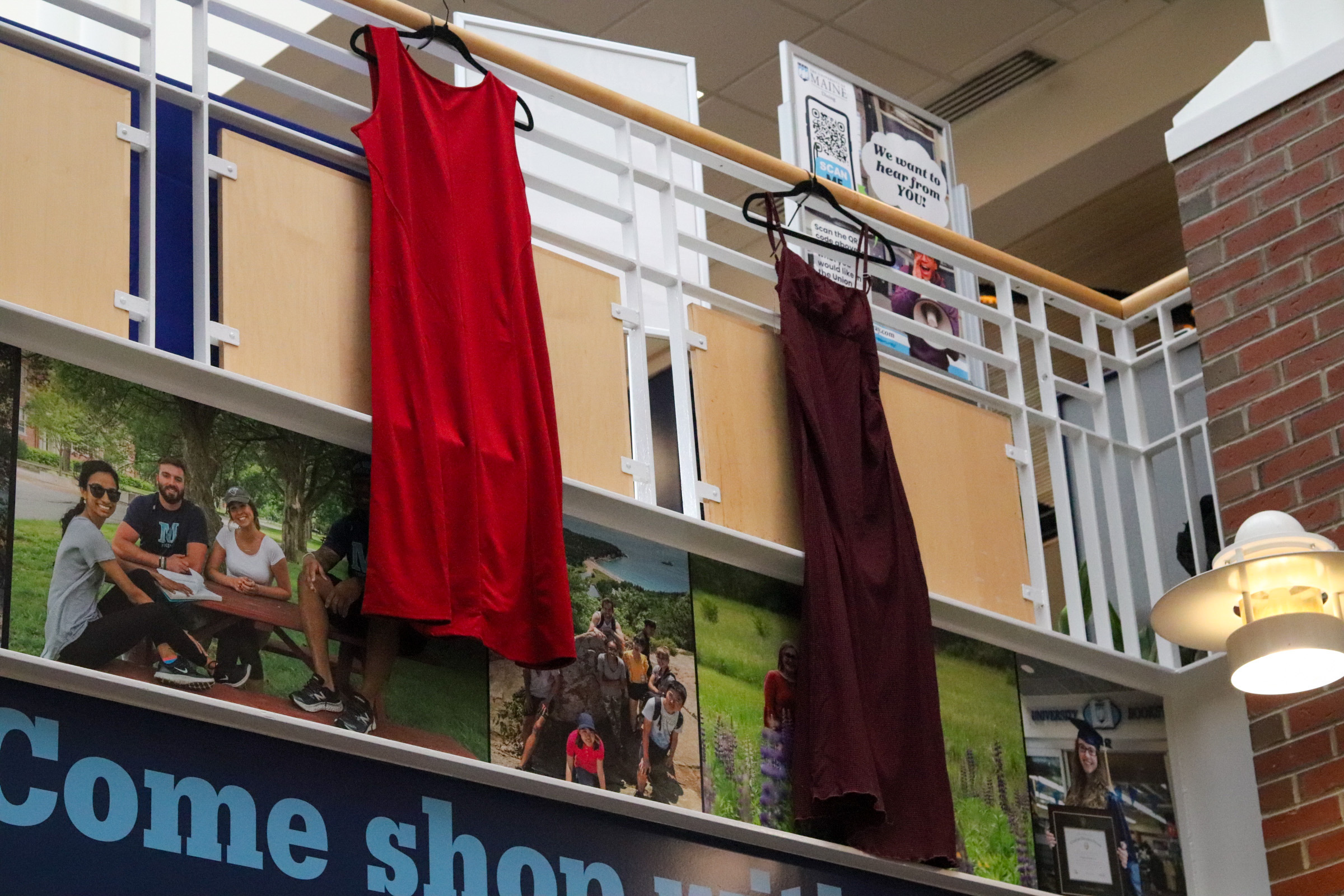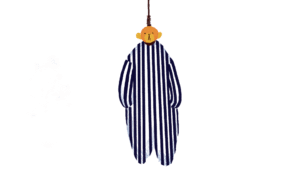The ‘Missing and Murdered Indigenous Women’s movement’ (MMIW) is rooted in the reality that Native American communities (especially women and girls) face rates of violence that far exceed national averages in the U.S and Canada. According to a 2016 study by the National Institute of Justice, more than four in five American Indian and Alaska Native women have experienced violence in their lifetime, which includes the 56.1% of women who have experienced sexual violence.
In an effort to support MMIW and other grassroots movements addressing the crisis, the University of Maine’s Indigenous Solidarity Action Team and Triota partnered to host an event on Nov. 19 in recognition of the movement. At the hour-long luncheon that began at noon outside the Memorial Union bookstore, donated red dresses symbolizing “all the Indigenous Women, Girls and Two Spirit people who have been taken from their communities” were hung from the balcony above and several speakers delivered their thoughts surrounding the crisis.
The event began with a speech from Indigenous Solidarity Action Team and Passamaquoddy Tribe member Liliana Sapiel, who provided more context behind the choice to display red dresses as a symbol.
“We have a display here — we’re gonna get more red dresses. But the point is, if you look up and see these red dresses, [it] is to showcase the missing and murdered Indigenous women not [as] a statistic but as a physical representation,” said Sapiel. “I want you to look at these dresses everyday, and see that these are people who are very close to you. We are on Marsh Island. We are still here today.”
Sapiel then introduced Indigenous Solidarity Action Team member Nate San Pedro, who read a land acknowledgment aloud to the small group of attendees.
“I’m just going to start off by saying that you are on stolen land, and this land is Penobscot land here on Marsh Island where the University of Maine is located. It’s important to recognize that the University of Maine and its organizations could not be here today if it hadn’t been for the calculated genocide of Indigenous people here that continues to this day,” said San Pedro.
After finishing the land acknowledgement, Sapiel introduced Penobscot community member Nick Bear, who played a brief song in honor of those missing within the Indigenous community. Bear is a drummer, singer and works for Wabanaki REACH, which is a local organization that supports “the self-determination of Wabanaki people through education, truth-telling, restorative justice, and restorative practices,” according to their website.
After introducing himself, Bear explained why he decided to play a song.
“I’ve been drumming and singing since I was ye high. My dad and my uncles, all my cousins, they all really loved our music and thought it was very important for us to share it. And especially for events like this, I think it’s important to tell our stories — with our music, our songs, our dances — and this is my offering of some good medicine today,” said Bear.

Following Bear’s song, Sapiel retook the microphone and explained the importance of women within Native culture, re-emphasizing that real lives lost are often flattened to less emotionally resonant statistics.
“In Native culture, we follow matriarchs, [and] women are very powerful. You all come from women, right? So, it’s really important that we protect our women and that we protect our children and that we protect Indigenous people as the first people who were here,” said Sapiel. “We are ten times more likely than any other race to have violence. Four out of five Indigenous women suffer from violence. And that is a statistic that should not exist. These are people. These are people who have gone missing, who have gotten murdered. So this is a real thing, and I’m glad that you are all here to show up,” said Sapiel.

Sapiel then passed the microphone to UMaine Triota President Casper Cowan, who helped organize the event and shared his thoughts on allyship and ways that the UMaine community can better support efforts to address the ongoing crisis.
“You have the capacity to uplift voices without talking over them…You don’t have to go from zero to one hundred and know everything about a culture instantaneously — it starts with a moment; it starts with a question, it starts with research, and it starts with a conversation — it starts with a little step every single day,” said Cowan.

Cowan closed by touching on ways UMaine students can get involved, highlighting the role Triota can play in hosting student events that raise awareness for various issues in the community.
“You will never fully understand what or be able to empathize and experience the way that other cultures [and] other people experience marginalization. But we can relate to it with our own experiences…and it helps me become a little bit more empathetic every single day, and I think that that’s something I really want everyone that’s here to take out of this experience. Take what you learned, take what you saw — you don’t have to replicate a big program like this, you don’t have to make a huge wave,” said Cowan, “but if every single one of us just made a little switch, a little change, was a little kinder every single day, we’d live in a much more beautiful and equal world.”
Cowan added that those interested in hosting an event or getting involved can contact Triota directly at casper.cowan@maine.edu for help getting started.
The event ended with attendees being served a small assembly of foods, with those gathered sitting together in community and discussing topics brought up throughout the event.
“I think part of being here and having this showcase with all these dresses is to come together as a community, and have these hard conversations. So, what’s better to do than have conversation over food?” said Sapiel.
Red dress donations are still being accepted at the Multicultural Student Center in Room 312 of the Memorial Union. The dresses will remain hanging from the balcony near the Bear’s Den throughout November, which is Native American Heritage month.







